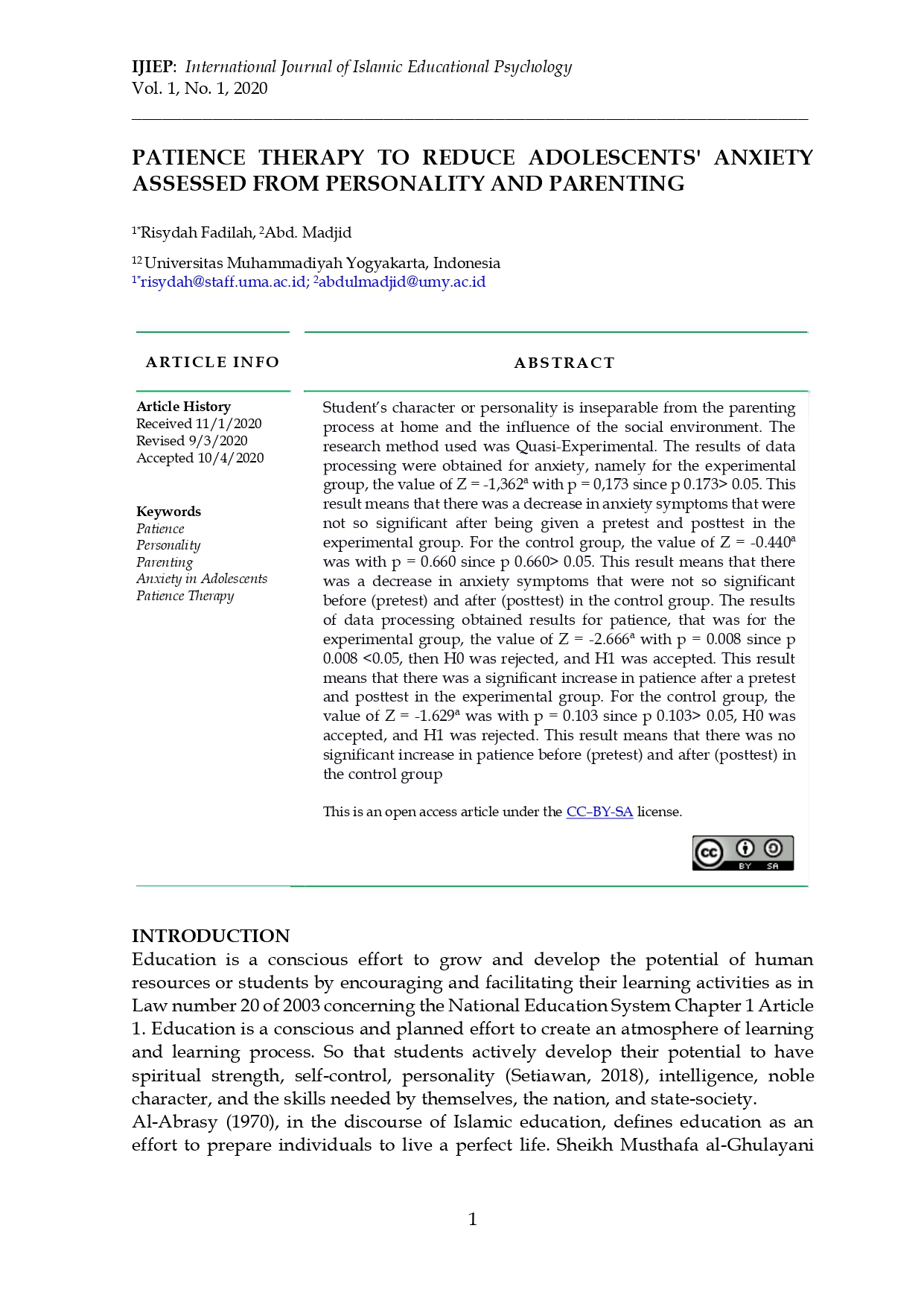Development of Prophetic Intelligence (Phenomenology Study of Religious Transformation)
DOI:
https://doi.org/10.18196/ijiep.1102Keywords:
Intelectual Intelligence, Spritual Intelligence, Emocional IntelligenceAbstract
This research is a study of the process and results of Prophetic Intelligence development conducted by Kalong students (students who are not staying in the school) in the Roudhotul Muttaqien Islamic boarding school led by KH Hamdani Bakran Adz Dzakiey. This type of research is qualitative research design with Phenomenology Study. Data collection techniques used involved observation, interview, and documentation. Qualitative data analysis used Interpretative Phenomenology Analysis (IPA) and Validity testing used triangulation and reflection. The results of this study are; 1) there are several transformation phases of the mystical experience of the kalong student with three sequences, a) Pre-transformation process in the desire to feel the essence of worship, b) the process of transformation in the derive of mystical experience towards Allah, and c) Post-transformation process that describes changes in a more religious mindset and more polite behavior and gives benefit to the surrounding. The mastery of prophetic intelligence by kalong student is grouped in two ways; a) mastery of quantitative competencies, including mastery of intellectual intelligence, spiritual intelligence, emotional intelligence, and perceptual intelligence in a prophetic perspective, b) mastery of qualitative competencies in accordance with the essence of prophetic intelligence, such as turning the body into a light that shows the attainment of clarity of heart, obtaining abilities that had not previously been studied (getting Laduni's knowledge).
References
Adz-Dzakiey, H. B. (2015). Prophetic Intelligence; Kecerdasan Kenabian Menumbuhkan Potensi Hakiki Insani Melalui Pengembangan Kesehatan Ruhani. Yogyakarta: Islamica.
Asy’arie, M. (2005). Islam: Keseimbangan Rasionalitas, Moralitas dan Spiritualitas. Yogayakarta: LESFI.
Chaer, M. T. (2017). Islam dan Pendidikan Cinta Damai. Istawa: Jurnal Pendidikan Islam, 2(1), 73-94.
Creswel, J. W. (2013). Qualitative Inquiry & Research Design. London: SAGE Publications India.
Gardner, H. (2003). Multiple Intellegences, (A. Sindoro, Trans. Terjemahan ed.). Batam: Interaksara.
Goleman, D. (2001). Working with Emotional Intellegence (A. T. K. Widodo, Trans. Terjemah ed.). Jakarta: PT Gramedia Pustaka Utama.
Grinnell, R. (2018). Intelligence. Psych Central(25).
Hayat. (2013). Pendidikan Islam dalam Konsep Prophetic Intelligence. Jurnal Filsafat Pendidikan Islam, II(2).
Idrus, M. ( 2009). Metode Penelitian Ilmu Sosial. Yogyakarta: Gelora Aksara Pratama.
Kuswarno, E. (2008). Etnografi Komunikasi. Bandung: Widya Padjadjaran.
Masaong, A. K. (2013). Urgesi Pakem dalam Penguatan Sinergi Kecerdasan IQ, EQ dan SQ Mahasiswa. from Universitas Negeri Gorontalo http://repository.ung.ac.id/karyailmiah/show/189/urgensi-pakem-dalam-penguatan-sinergi-kecerdasan-iq-eq-dan-sq-mahasiswa.html
Masyaharudin, A. S. (2012). Intelektualisme Tasawuf: Studi Intelektualisme Tasawuf Al Ghazali. Semarang: Pustaka Pelajar.
Roqib, M. (2011). Prophetic Education: Kontekstualisasi Filsafat dan Budaya Profetik dalam Pendidikan. Purwokerto: STAIN Press.
Roqib, M. (2013). Pendidikan Karakter Dalam Perspektif Profetik. Jurnal Pendidikan Karakter, 3(3).
Setiawan, W. (2016). Fanatisme Dalam Berorganisasi. Muaddib: Studi Kependidikan dan Keislaman, 4(1), 20-44.
Setiawan, W., & Iman, N. (2019). Filantropi Islam Sebagai Media Peningkatan Kebahagiaan Muslim Indonesia. Paper presented at the Proceedings of Annual Conference for Muslim Scholars.
Setiawan, W., Tajab, M., & Chaer, M. T. (2019). Ruh, Soul, Heart, Mind, and Body in the Perspective of Islamic Educational Psychology. Paper presented at the WESTECH.
Sukmadinata, N. S. (2011). Metode Penelitian Pendidikan. Bandung: Remaja Rosdakarya.
Suud, F. M. (2018). Pendidikan Kedamaian di Era Digital (Telaah Model Forgiveness dalam Psikologi Islam). FIKROTUNA: Jurnal Pendidikan dan Manajemen Islam, 7(1), 694-716. doi:10.32806/jf.v7i1.3170
Suud, F. M., & Madjid, A. (2020). Honesty: A Multidimensional Study as Motivation for National Character Building. Hayula: Indonesian Journal of Multidisciplinary Islamic Studies, 4(1), 99-116. doi:10.21009/hayula.004.1.06

Downloads
Published
How to Cite
Issue
Section
License

- Share — copy and redistribute the material in any medium or format
- Adapt—remix, transform, and build upon the material for any purpose, even commercially.
The licensor cannot revoke these freedoms as long as you follow the license terms. Under the following terms:
- Attribution: You must give appropriate credit, provide a link to the license, and indicate if changes were made. You may do so in any reasonable manner, but not in any way that suggests the licensor endorses you or your use.
- ShareAlike: If you remix, transform, or build upon the material, you must distribute your contributions under the same license as the original.
- No additional restrictions — You may not apply legal terms or technological measures that legally restrict others from doing anything the license permits.






